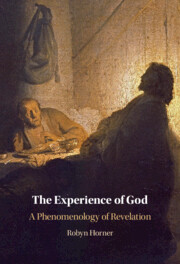Book contents
- The Experience of God
- The Experience of God
- Copyright page
- Contents
- Acknowledgements
- Part I The Problem in Context
- Part II Revelation in Contemporary Philosophy and Theology
- Chapter 3 Revelation as a Philosophical Problem
- Chapter 4 Revelation as a Theological Problem I
- Chapter 5 Revelation as a Theological Problem II
- Part III The Event of Revelation
- Part IV The Event in Person
- Bibliography
- Index
Chapter 5 - Revelation as a Theological Problem II
The Bifurcation of Revelation
from Part II - Revelation in Contemporary Philosophy and Theology
Published online by Cambridge University Press: 13 October 2022
- The Experience of God
- The Experience of God
- Copyright page
- Contents
- Acknowledgements
- Part I The Problem in Context
- Part II Revelation in Contemporary Philosophy and Theology
- Chapter 3 Revelation as a Philosophical Problem
- Chapter 4 Revelation as a Theological Problem I
- Chapter 5 Revelation as a Theological Problem II
- Part III The Event of Revelation
- Part IV The Event in Person
- Bibliography
- Index
Summary
In Chapter 5, I look at how revelation is understood in Catholic theology. There are two fundamental approaches to understanding this concept: the propositional ('static') and the relational ('dynamic'), which are sometimes at odds with one another. While propositional accounts provide the conditions of possibility (and impossibility) for conversations about God’s revelation to take place, and provide principles against which the discernment of truth can be evaluated, propositions can harden and become brittle as they are brought into new contexts. When this happens, the symbolic nature of all talk of God is forgotten, and the literal sense is brought to the fore. Propositions are weaponised and used in authoritarian ways to resist difference and change. This alienates the church from the culture/s in which it is embedded, making some of its choices and actions inexplicable and others indefensible. I then consider the relationship between revelation and tradition more closely. I argue that the proper work of developing tradition is not to defend propositions that have ceased to promote authentic reflection on revelation in dialogue with the context, but to renew what lies at its heart.
Keywords
- Type
- Chapter
- Information
- The Experience of GodA Phenomenology of Revelation, pp. 76 - 92Publisher: Cambridge University PressPrint publication year: 2022



